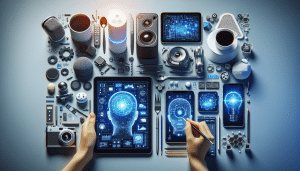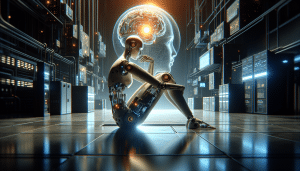Surprising Ways Artificial Intelligence Impacts Daily Life
Aiden Foster October 25, 2025
Artificial intelligence is no longer a futuristic dream. From smartphones to healthcare and transportation, AI technology now shapes everyday experiences in subtle and remarkable ways. Explore how this evolving science is influencing modern society, changing choices, and opening up new possibilities.
How AI Shapes Everyday Decisions
Artificial intelligence is woven into many aspects of daily routines, affecting personal and professional lives in ways that often go unnoticed. For example, AI-powered recommendation engines help individuals discover music, movies, and even new hobbies that align with their interests. These engines use complex algorithms to analyze previous selections and predict what may appeal next, subtly guiding user experiences. Consumers also interact with AI when shopping online—where automated systems suggest related products based on browsing history and preferences, sometimes even alerting about price changes or limited availability. This level of personalized service has shifted expectations, making daily decisions easier while boosting engagement.
The practical role of AI extends further into the home. Smart assistants respond to voice commands to control music, lighting, or home security devices. These digital companions, driven by machine learning, learn from repetitive actions to anticipate needs—such as adjusting thermostat settings before occupants arrive or reminding about scheduled tasks. In the kitchen, smart appliances adjust cooking programs based on recipe data, optimizing results and reducing time spent on meal prep. This seamless integration of artificial intelligence has made it possible for many households to operate more efficiently, leaving more energy for other pursuits.
AI also enables safer and more reliable transportation. Navigation apps factor live traffic data, weather conditions, and user preferences to suggest optimal routes. Ride-sharing platforms use dynamic pricing and intelligent matching algorithms to connect riders with nearby drivers, minimizing wait times and reducing traffic congestion. These innovations illustrate how artificial intelligence acts as an invisible partner, influencing decisions with the potential to streamline daily commutes and improve overall quality of life. As dependence on digital infrastructure grows, the role of AI in supporting daily choices is expected to deepen.
AI and Healthcare Advancements
Healthcare is one of the sectors most profoundly impacted by artificial intelligence. AI-powered diagnostic tools are now assisting clinicians in detecting diseases earlier and more accurately, especially in fields like radiology and pathology. By analyzing vast amounts of medical images or patient data, machine learning models can highlight subtle patterns invisible to the human eye. In some hospitals, chatbots powered by natural language processing answer routine patient questions, freeing up healthcare staff for urgent needs. This approach not only improves patient outcomes but also helps manage provider workloads more efficiently.
Pandemic responses have also illustrated the transformative role of artificial intelligence in public health. Predictive models processed by AI forecast outbreak trends and anticipate resource needs, helping authorities make informed decisions on interventions and supplies. Vaccine distribution systems employ AI algorithms to track inventory, plan delivery routes, and identify priority recipients based on vulnerability or exposure risk. These systems reflect the recent evolution of medical technology and underline the potential of AI to support the health sector during large-scale emergencies.
On a personal level, wearable health devices harness AI to track heart rates, sleep patterns, and physical activity. They analyze data trends to provide actionable insights, such as signaling irregularities indicating possible health concerns. Some smartwatches even use AI for arrhythmia detection, alerting wearers to consult a doctor. While AI cannot replace traditional care, it democratizes access to wellness tools and promotes proactive health management, signaling a shift toward more engaged and informed communities.
AI in Modern Communication and Media
Artificial intelligence has quietly transformed how people consume and interact with information. Social media feeds, news platforms, and video services use AI algorithms to curate personalized content, highlighting stories and posts that are likely to engage each viewer. These algorithms optimize user engagement but can influence public perception by shaping the news delivered. Language models help automate content moderation, flagging inappropriate or misleading posts to maintain safer and more positive online environments. The impact of AI on communication extends to increasing accessibility, including auto-captioning for videos and translation services that break language barriers.
Chatbots and virtual agents powered by AI offer instant support for customer inquiries and technical issues, responding around-the-clock in multiple languages. Many businesses have adopted these intelligent agents to streamline customer service and provide rapid, accurate answers. In content creation, AI tools assist with drafting articles, editing images, and generating music, supporting both professionals and hobbyists to produce high-quality results without extensive technical skills. This democratization of creativity is expanding opportunities for audiences worldwide.
Voice technology represents another leap forward in media consumption. Speech recognition enables hands-free interaction with devices, transcribing interviews or providing real-time translations. Podcasts, audiobooks, and news briefings are increasingly tailored by AI to fit individual listening preferences and routines. As media becomes more customizable, AI’s influence over communication patterns and choices—whether written, spoken, or visual—continues to expand.
AI and Workplace Transformation
From process automation to intelligent data analysis, artificial intelligence is reshaping traditional workplaces. Many organizations deploy AI to streamline administrative tasks, such as scheduling meetings, processing invoices, or organizing digital files. These applications release professionals from repetitive tasks so they can focus on creative, strategic projects. Project management software uses AI algorithms to coordinate resources and predict bottlenecks, enabling faster decision-making and more efficient project outcomes. The use of AI-driven productivity tools fosters agility and collaboration, supporting teams especially in hybrid or remote environments.
AI is also redefining skill sets required for many roles. The rise of data analytics, machine learning programming, and automation design has led to a demand for continuous learning and adaptation. Many online platforms offer AI courses and training, equipping workers to navigate a future where collaboration with intelligent systems is standard. While the adoption of AI raises concerns over job displacement in some sectors, it also creates new opportunities to develop digital literacy and participate in innovative fields.
Recruiting and talent management have benefited from AI as well. Machine learning models screen resumes and match qualifications to job requirements, striving to minimize human bias. AI-powered chatbots conduct initial candidate screenings, providing immediate feedback and guidance. Although AI supports efficiency here, experts emphasize the value of ethical oversight to ensure that automated systems promote fairness and diverse workforces.
Challenges and Ethical Considerations in AI Adoption
As artificial intelligence gains a more prominent role, several challenges and ethical concerns emerge. Bias in algorithms can perpetuate inequalities, especially if training data lacks diversity. For example, facial recognition technologies have shown varying levels of accuracy across demographic groups, raising privacy and civil liberty concerns. Transparent and explainable AI is a growing area of focus, as experts advocate for systems that make decisions in understandable ways, allowing stakeholders to hold them accountable. Addressing bias and transparency is essential for building public trust.
Data privacy sits at the core of ethical AI deployment. Intelligent systems rely on sensitive personal data, such as location, health, or spending habits, raising questions about consent and data ownership. Several organizations, including leading technology companies and research institutes, promote privacy-preserving machine learning approaches. These techniques allow AI models to learn from data without centralizing or exposing sensitive information—an important step for ensuring individual security and regulatory compliance.
AI’s unpredictability in complex settings presents further risks. Autonomous vehicles and automated trading systems, for example, must accurately interpret dynamic environments or markets. When failures occur, the consequences can be significant. Developing robust, reliable, and safe AI requires thorough testing and collaboration between technologists, policymakers, and end users. Continuous scrutiny and adaptive regulations will be necessary to harness the benefits of artificial intelligence while minimizing unintended harms.
The Future of AI in Society
Looking ahead, artificial intelligence is set to influence even more facets of society. Ongoing research explores possibilities from climate modeling and disaster response to advanced robotics in elder care. Institutions worldwide study how AI can improve resource allocation, enhance urban planning, and increase the sustainability of critical systems. These projects promise to unlock innovative solutions to global challenges but also require careful consideration of limits and trade-offs. Anticipating the needs of tomorrow means investing in AI literacy, infrastructure, and thoughtful governance.
Education is expected to benefit significantly from AI adoption. Intelligent tutoring systems can adapt lessons to individual student needs, creating personalized pathways and supporting lifelong learning. Universities and public initiatives increasingly integrate AI courses and foundational skills into their programs, preparing future generations for a more interconnected world. Automation in research—such as literature reviews, data analysis, and experiment design—is accelerating discoveries across disciplines, making scientific inquiry more accessible and efficient than ever.
At its core, AI represents both a powerful tool and a challenge. Used responsibly, AI can enrich daily experiences, advance health and knowledge, and open new doors for creativity and progress. The ongoing journey will likely involve learning from setbacks, upholding ethical standards, and ensuring equitable access to the opportunities artificial intelligence brings. As technology evolves, so should the collective understanding of its role in society.
References
1. European Commission. (n.d.). Artificial Intelligence. Retrieved from https://digital-strategy.ec.europa.eu/en/policies/artificial-intelligence
2. U.S. Food and Drug Administration. (n.d.). Artificial Intelligence and Machine Learning in Software as a Medical Device. Retrieved from https://www.fda.gov/medical-devices/software-medical-device-samd/artificial-intelligence-and-machine-learning-software-medical-device
3. MIT Technology Review. (n.d.). How AI is changing the workplace. Retrieved from https://www.technologyreview.com/2022/03/28/1048161/how-ai-is-changing-the-workplace/
4. World Health Organization. (n.d.). Ethics and governance of artificial intelligence for health. Retrieved from https://www.who.int/publications/i/item/9789240029200
5. OECD. (n.d.). Artificial Intelligence in Society. Retrieved from https://www.oecd.org/publications/artificial-intelligence-in-society-eedfee77-en.htm
6. Stanford University. (n.d.). Artificial Intelligence Index Report. Retrieved from https://aiindex.stanford.edu/report/








